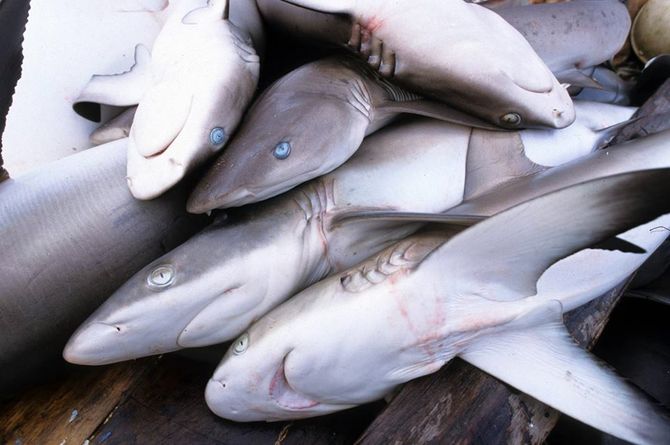Dive Boat Science
Over the last couple of weeks we have received several concerned emails from enthusiastic divers about the “disappearance of sharks” from the Egyptian Red Sea, a scenario they reckoned the obvious result of months of illegal fishing operations possibly happened throughout the year, taking advantage of the post-revolution instability. Drawing such conclusions without a robust scientific dataset, using limited data such as a few personal occasional observations is nothing but shallow interpretation and dramatisation of a complex ecological situation. For decades divers have visited reefs such as Elphinestone and Deadalus and not seen sharks for weeks and then seen dozens in a single dive. This year we had an unusual high numbers of hammerhead sharks encounters in Elphinstone, many sharks were reported last summer in the whole region. This is to say that fluctuations in the prevalence of shark species in specific locations and seasons are normal and this is no cause for alarm per se. Of course all possible efforts should be devoted to understand all the factors (anthropogenic and not) playing a role in the ecology of these magnificent predators. Believing in an assumption and considering it as the truth by simplifying the many interconnections representing an ecosystem and its inhabitants into a univocal relationship, risks to be detrimental and harmful. Sharks haven’t disappeared from the Red Sea, the beloved Oceanic Whitetips are still here, as reports from divers and operators have confirmed. We therefore call upon those concerned enthusiasts to revaluate their argument: the absolute condemnation and concern we all share regarding shark fishing and finning operations possibly happening in our waters should not confine and narrow down our reasoning to this aspect solely. Sadly we are yet to fully understand the movement patterns and home ranges of sharks in the Red Sea: a lot of scientific data is yet to be collected in order for us to be able to accurately predict and explain the prevalence at any location at any point of time. Fluctuations in different seasons are normal due to the great number of variables playing a role, seasons may shift from year to year and long-term patterns are not understood. Over the past two years the number of sightings of Oceanic Whitetip Sharks was much higher than the decade before, unfortunately we do not have sufficient data to explain why this occurred. The issue is very complex and a “snapshot” on a certain day, week, month, season or year can not be considered as an indicator of the status of the shark population of the Red Sea. However, the diving community can do a lot to help understand the presence and movement patterns of the species better: in 2011 HEPCA launched a pilot monitoring programme, entitled MEGABase, with several dive centres along the Egyptian Red Sea coast, in order to collect in a regular and systematic way as many “snapshots” as possible. If you do sight any shark species please report them to your dive centre if it is among the pilot group, otherwise through the HEPCA website. Your “snapshot”, when analysed together with many other “snapshots” is an important piece of the puzzle. Speculations and assumptions about shark fishing cannot be made without documented evidence and almost no reports have been delivered in recent months concerning this type of activity. Shark fishing longlines are very distinctive and in the past have always been reported by concerned members of the diving community and often stopped by them. In the summer of 2010 safari boat operators played a crucial role in the capture of Yemeni shark de-finning boats where several operators pulled out kilometres of longlines from the water rescuing several dozen sharks. Reports that fisherman from the Egyptian Red Sea partake in the capture of sharks are negligible; as historically it is an activity that has been shunned upon. Most often those partaking in such activity are not from the region and operators and crews do not fear reprisal. If anyone has witnessed any shark fishing or any other violation please do report it via the HEPCA website. Shark fishing is illegal in the Red Sea and authorities have taken strong action against violators over the last few years: if you do not report such violations you are partaking in the crime! Those who have chosen to take matters into their own hands and conduct illegal, environmentally destructive activities potentially endangering human life, such as chumming, in the name of pseudoscience or any other cause are criminals violating sound environmental regulations and disrespecting the rule of the law and fellow divers. HEPCA will undertake all legal measures to insure that these individuals or organizations are brought to justice. Encountering key species in the wild is an exhilarating joyous experience; one must not presume that every time they go diving at certain locations they will be so privileged and operators must make it clear to their guests that these encounters are not guaranteed.



